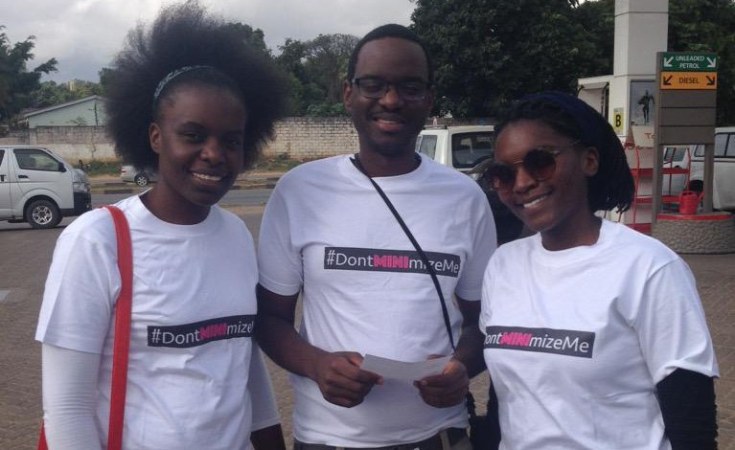Lusaka — Driving to work I heard a call-in radio show about a woman who had been stripped naked in the streets because her dress was seen as indecent.
Not one of the perpetrators of the stripping had been arrested, even though witnesses had taken photos and videos and posted them all over social media. Callers expressed the opinion that the woman had gotten what she deserved.
"Women have gone too far with their dressing; a woman's thighs are only for her husband to see," one caller said.
So upset by this and similar comments, for the rest of the day all I did was research ways I could do something to highlight this injustice. By the end of that day, a movement was born!
A few weeks later I joined over 20 women and men who diverted traffic and marched down one of Lusaka's busiest roads chanting the words "DON'T MINIMIZE ME" – referring to complaints about mini-skirts as well as to the attitude towards woman that such assaults epitomize.
UN Women estimates that about 40 to 50 per cent of women in European Union countries experience unwanted sexual advances, physical contact or other forms of sexual harassment at work. This might not seem an urgent problem - because no one is getting hurt, right?
Wrong. Human rights advocates stress that unless women are free from the threat of violence, they are unable to realise their other rights. For example, a woman cannot exercise her rights to livelihood, education, mobility, health or participation in governance if she is prevented from leaving her home under threat of violence.
For a little context on how far reaching the issue is here at home, in 2013 Zambia was ranked as the number one country in southern Africa for having the highest number of gender-based violence cases.
For me, it seems like the moment I turned 12 my body ceased to be my own. Since then I have been considered many things: a helper, a cook, a wife, an incubator or an object of attraction - almost never a person.
When I read about puberty and the changes to your body that come with it, I was excited. To me it meant I could finally be a grown up, and when I got my first bra I thought I had 'arrived'. But that anticipation and joy was quickly replaced by fear, embarrassment and anxiety.
My life had to change. I had to be careful how I dressed, where I walked or how I talked. I could only use 'safe' routes. I had to ignore the catcalls and when a man grabbed or groped me all I could do is walk away feeling violated. For a long time, like the many women today and in the past, I continued to live my life this way, and whenever I got harassed I blamed myself. I thought, "I shouldn't have worn that skirt," or "those jeans" or used "that bus." I did not feel free.
But after that radio program and hearing how everyone else had something to say about that horrible situation except the woman herself, I decided that something needed to be done.
I have always believed there is strength in numbers, mostly because so many influential people say that all the time. But during this past year as a Global Health Corps fellow, the things I have been able to achieve are proof of this fact. Armed only with the idea that silence was no longer an option, five amazing women – including my GHC co-fellow – participated in planning a march that would show our solidarity with other women who had experienced violence and bring awareness to this less-documented form of violence against women.
Each of us delved into our rich networks and found ideas, comradery, connections, sponsorship and funding. Together we created and managed a Facebook page to spread the word of our movement and established the hashtag #Don'tMINImizeMe.
The day of the march was one of the best days of my life, partly because I felt we had achieved something against the odds, but most of all I realized just how wonderful it felt to finally speak out and stand up for myself and for what was right. It was as though with every chant I was getting back bits of dignity that had been stripped away from me, for myself and for other women.
These amazing women and I took a chance at doing something we were passionate about and we succeeded. I am very sure we could not have done it as individuals.
For me, the next steps are continuing to push this agenda every way I can. I have learnt a lot from this experience about communications and advocacy and for the future would like to bring the concept behind the #DontMINImizeMe movement to the attention of as many law makers as possible to remind them that Zambia as a state needs to honour its commitment to the UN declaration on violence against women and prevent violence against women in all its forms and bring perpetrators to justice.
Angel Chelwa is a 2014-2015 Global Health Corps Fellow


